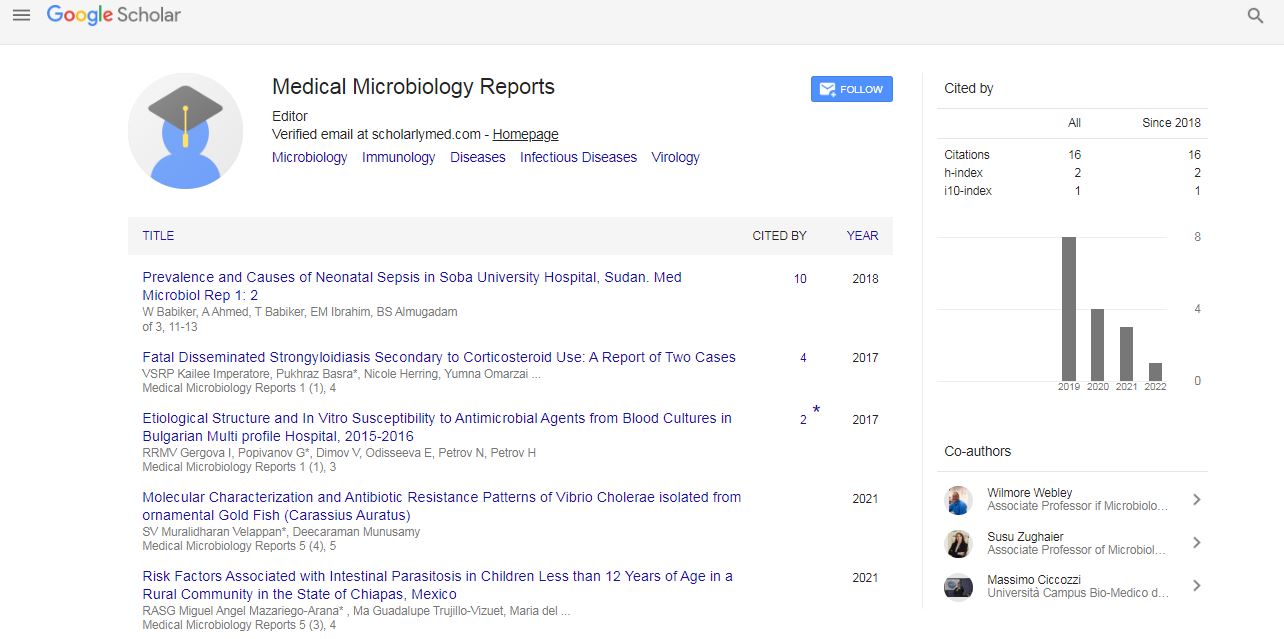Perspective, Med Microbiol Rep Vol: 7 Issue: 3
Cases in Medical Microbiology: Its Importance and Applications
Nick Paul*
Department of Microbiology and Infection Control, Akershus University Hospital, Lørenskog, Norway
*Corresponding Author: Nick Paul,
Department of Microbiology and Infection
Control, Akershus University Hospital, Lørenskog, Norway
E-mail: paulnick@edu.no
Received date: 01 September, 2023, Manuscript No. MMR-23-117993;
Editor assigned date: 04 September, 2023, PreQC No. MMR-23-117993 (PQ);
Reviewed date: 18 September, 2023, QC No. MMR-23-117993;
Revised date: 25 September, 2023, Manuscript No. MMR-23-117993 (R);
Published date: 02 October, 2023 DOI: 10.4172/MMR.1000349
Citation: Paul N (2023) Cases in Medical Microbiology: Its Importance and Applications. Med Microbiol Rep 7:3.
Description
Medical microbiology is a vital field within the broader scope of microbiology that focuses on the study of microorganisms with relevance to human health. These microorganisms include bacteria, viruses, fungi, and parasites, and they play a pivotal role in various aspects of medicine, from diagnosing infectious diseases to understanding the intricacies of the human immune system. This branch of microbiology is indispensable for the prevention, diagnosis, and treatment of infections and is at the forefront of efforts to combat emerging infectious diseases.
Microorganisms and their significance
Microorganisms, commonly referred to as microbes, are microscopic life forms that can be classified into several categories:
Bacteria: These single-celled prokaryotic organisms come in various shapes and sizes and can be found virtually everywhere. While many bacteria are harmless or even beneficial to humans, some are pathogenic and cause diseases like tuberculosis, cholera, and streptococcal infections.
Viruses: Viruses are extremely small infectious agents that lack cellular structure. They can only replicate inside the host cells, causing diseases like the flu, HIV/AIDS, and COVID-19.
Fungi: Fungi include yeasts and molds and are responsible for infections such as candidiasis and aspergillosis.
Parasites: These are multicellular organisms, such as protozoa and helminths that can live within or on the host, causing diseases like malaria and tapeworm infections.
Importance of medical microbiology
Medical microbiology plays a critical role in various aspects of healthcare and public health. Here are some key reasons why it is of utmost importance:
Infectious disease diagnosis: Medical microbiologists are responsible for identifying the causative agents of infectious diseases. Accurate and timely diagnosis is essential for effective treatment and disease control.
Antibiotic resistance: The field helps in monitoring the emergence and spread of antibiotic-resistant bacteria, a global health crisis. Understanding these mechanisms is vital for preserving the effectiveness of antibiotics.
Vaccine development: Researchers in medical microbiology work on developing vaccines against various infectious diseases, leading to immunization and the prevention of illnesses on a large scale.
Infection control: Medical microbiology is central to implementing infection control measures in healthcare settings, helping to prevent the spread of infections within hospitals and other care facilities.
Emerging infectious diseases: The field is instrumental in monitoring and responding to new and re-emerging infectious diseases, such as the Ebola virus and Zika virus outbreaks.
Public health: It contributes to the formulation of public health policies and strategies to control and prevent the spread of infectious diseases within communities.
Applications of medical microbiology
Medical microbiology has a wide range of practical applications, some of which include:
Clinical diagnostics: Laboratories use various techniques to isolate and identify microorganisms from patient samples, allowing healthcare professionals to prescribe appropriate treatments.
Epidemiology: Understanding the epidemiology of infectious diseases helps in tracking their spread, identifying risk factors, and developing strategies for disease control.
Immunology: Research in medical microbiology contributes to our knowledge of the human immune system, including the development of vaccines and therapies.
Food Safety: Medical microbiology helps ensure the safety of food products by detecting and controlling pathogens that can cause foodborne illnesses.
Water quality: Monitoring and testing for microbial contaminants in water sources is vital to prevent waterborne diseases.
Biotechnology: Microbes are used in biotechnology for various purposes, including the production of antibiotics, enzymes, and genetically modified organisms.
 Spanish
Spanish  Chinese
Chinese  Russian
Russian  German
German  French
French  Japanese
Japanese  Portuguese
Portuguese  Hindi
Hindi 
